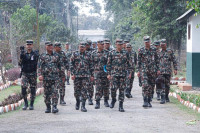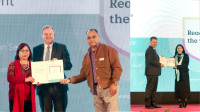National
Draft directives to regulate social media give authorities power to define decency and morality
Provisions of the directives, to be enforced by the Department of Information Technology, are from the controversial Information Technology Bill which is in Parliament.
Bijay Timalsina
The Ministry of Communication and Information Technology has prepared a draft of the directive to regulate the use and registration of social media in the country.
The draft, seen by the Post, indicates that the government plans to bestow unrestrained authority to the Department of Information Technology to regulate social media, its operators, and users.
The draft, if implemented, will authorise the department to order social media companies to remove any post it deems inappropriate. It also states that social media companies have to provide user data for purposes of criminal investigation even without an order from the court to do so.
“The department may direct the operators of social media to delete any posts [pertaining to activities] prohibited by the directive,” reads one of the provisions.
Most provisions in the draft correspond with those from the controversial Information Technology Bill, which was tabled in the Parliament in February 2019 and approved by the House committee concerned in December by disregarding dozens of amendment proposals.
Advocate Baburam Aryal, an expert on information technology law, said it is questionable that the provisions of a bill registered in Parliament are included in a directive. “The provisions of a bill are there to be discussed in Parliament,” Aryal said.“The government can’t include such provisions in a directive.”
One of the provisions in the directive mentions that social media companies need to be registered in Nepal if they want Nepalis to use their products. “Any individual (or company) interested in operating a social media company must register the social media concerned with the Department of Information Technology as per the directive,” the draft says. “Social media in operation before the enforcement of the directive must register themselves within three months after the rule comes into force.”
Industry experts say Nepal is a small market for global social media companies and it is unlikely that they will register themselves with the government. This could potentially lead to bans on popular social media outlets in the country, they say.
If it is proven that a registered social media has broken existing laws and provisions included in the directive, its registration will be scrapped, the draft states.
This provision corresponds to Section 91 of the controversial Information Technology Bill, which had been criticised widely.
The draft directive mentions that the document has been prepared under Section 79 of the Electronic Transaction Act, 2008.
However, advocate Pravin Subedi, an expert on laws related to information technology, argues that the Electronic Transaction Act doesn’t recognise social media. “The Electronic Transaction Act doesn’t say anything about social media,” Subedi said. “A directive cannot be issued on issues the Act doesn’t touch upon.”
The directive also includes guidelines for the operation of social media. “Necessary arrangements will be made to ensure posts aren’t unfavourable to public decency and morality,” states one of the provisions. “Information, data, and particulars demanded by any authorised institution during investigations as per existing laws should be provided by the social media operator.”
Aryal criticised this provision saying that it enables authorities to seek the personal information of social media users without court orders to do so. Further, as “public decency” and “morality” are not clearly defined, the government can take action against anyone critical to it by misusing this provision, Aryal argues.
Another provision states, “Any data or information posted against existing laws or public decency and morality must be deleted if asked to do so.”
According to Aryal, such a provision gives the government the authority to delete any content it finds objectionable. “What is the definition of public decency and morality?” Aryal asked.
Moreover, the authority to define such abstract concepts has been given to the department itself.
“If any issue arises regarding the implementation of the directive or concerning the operation and use of social media, it will be according to the decision of the department as per existing laws,” says the draft.
According to Aryal, such provisions give authority to the ministry or the government agency to come up with arbitrary decisions.
“This paves the way for the government to order the deletion of any social media post or take action against anyone for their social media posts,” he said.




 16.96°C Kathmandu
16.96°C Kathmandu














